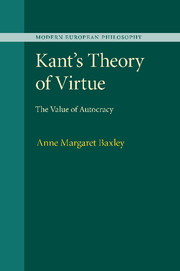Book contents
- Frontmatter
- Contents
- Acknowledgments
- Abbreviations and translations
- Introduction
- 1 The good will, moral worth, and duty: concerns about Kant's rationalist moral psychology
- 2 Kant's conception of virtue and the autocracy of pure practical reason
- 3 Virtue, human nature, and moral health: Kant's dispute with Schiller
- 4 The moral psychology of Kantian virtue
- Conclusion: Kant's considered account of moral character and the good will reconsidered
- Select bibliography
- Index
- References
1 - The good will, moral worth, and duty: concerns about Kant's rationalist moral psychology
Published online by Cambridge University Press: 06 December 2010
- Frontmatter
- Contents
- Acknowledgments
- Abbreviations and translations
- Introduction
- 1 The good will, moral worth, and duty: concerns about Kant's rationalist moral psychology
- 2 Kant's conception of virtue and the autocracy of pure practical reason
- 3 Virtue, human nature, and moral health: Kant's dispute with Schiller
- 4 The moral psychology of Kantian virtue
- Conclusion: Kant's considered account of moral character and the good will reconsidered
- Select bibliography
- Index
- References
Summary
Kant's views about moral and non-moral motivation in the Groundwork of the Metaphysics of Morals and the Critique of Practical Reason have been the basis for some of the most familiar criticisms of Kant's rationalism. On the basis of these texts, historical and contemporary critics of Kant's ethics have objected to his rigid moral psychology, which appears to ground moral duty in a thin conception of rational agency, making moral activity a matter of rational conscience, rather than a matter of character, virtue, emotion, and desire. Given their role within the foundations of Kant's moral theory, these views about the good will, moral worth, and duty will be important components in any attempt to reconstruct a complete Kantian account of virtue. In addition to motivating and structuring an examination of Kant's later and less familiar texts, which articulate a theory of virtue that accords moral value to a range of feelings, desires, and dispositions connected with sensibility, these doctrines may also constrain the details of Kant's moral psychology as elaborated in his theory of virtue, at least on an interpretation that seeks to preserve consistency across Kant's texts. After looking at the details of Kant's account of the good will and his well-known examples of acting from duty in Groundwork I, we consider four distinct worries about Kant's rationalist moral psychology.
- Type
- Chapter
- Information
- Kant's Theory of VirtueThe Value of Autocracy, pp. 7 - 47Publisher: Cambridge University PressPrint publication year: 2010



